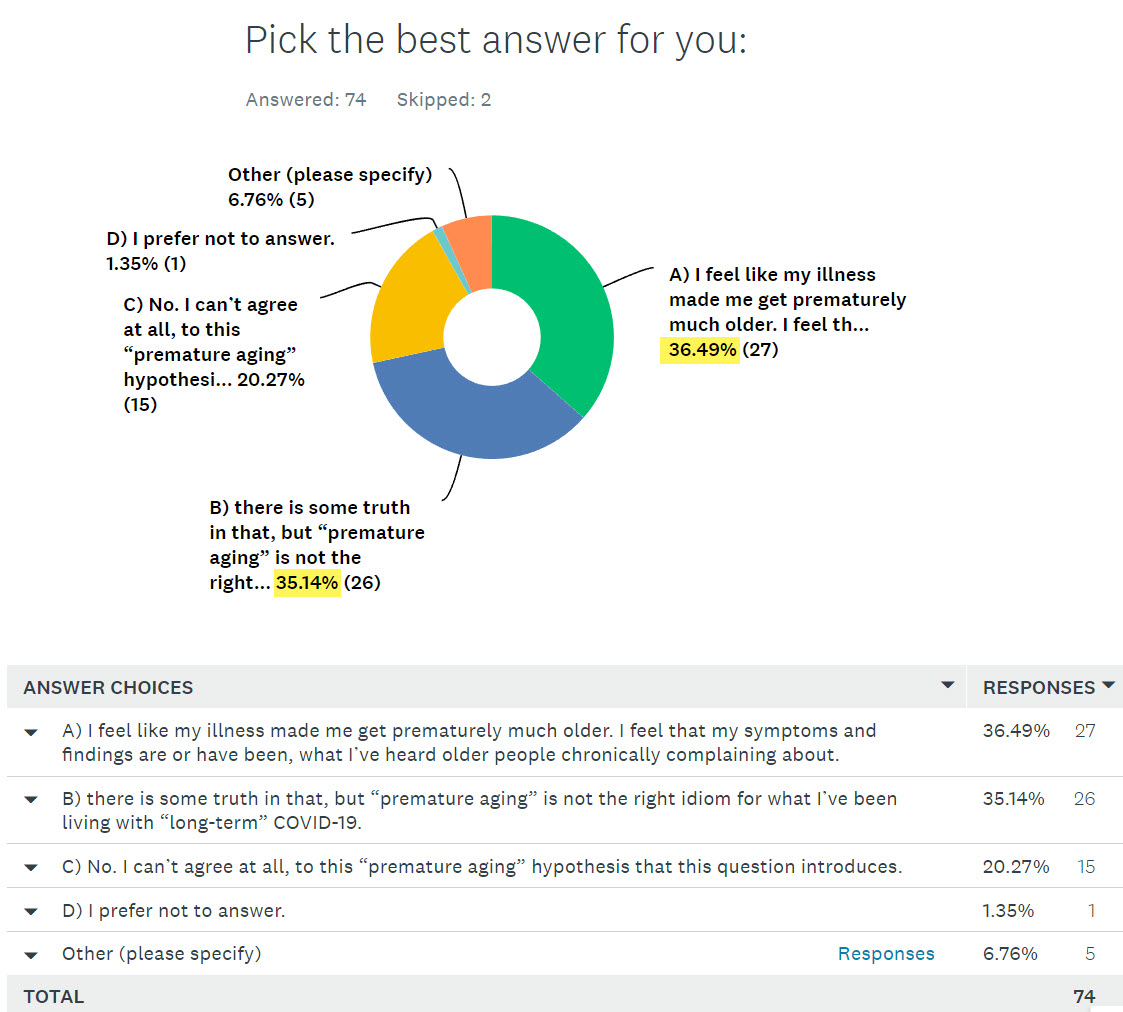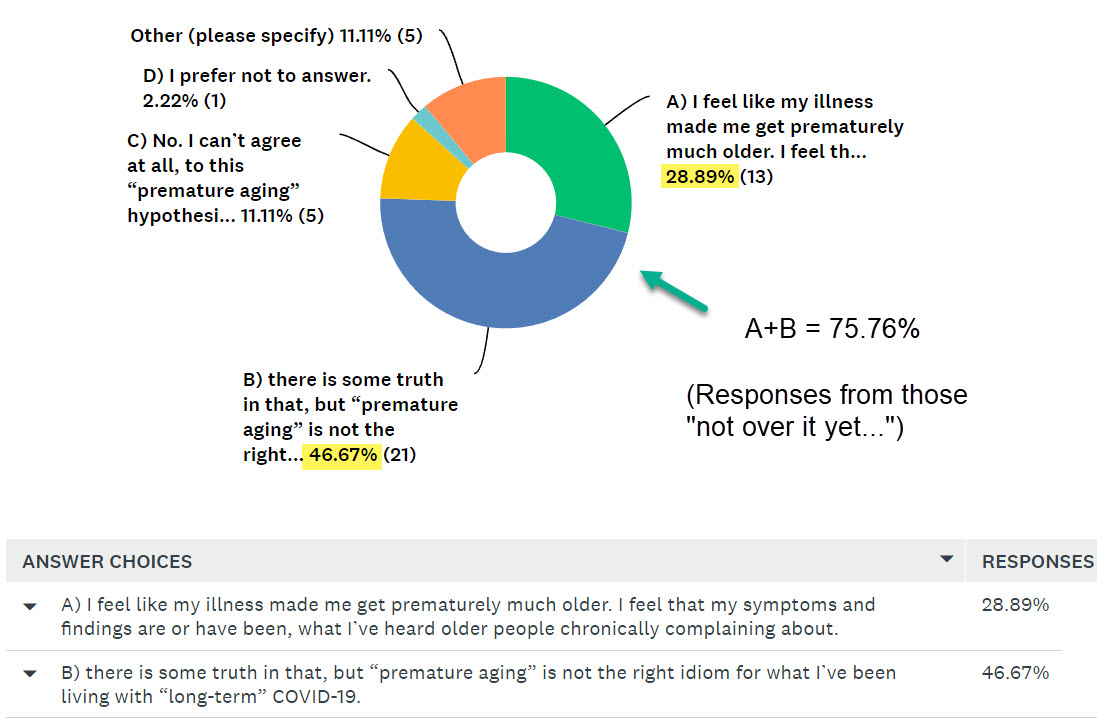Premature Aging and "long-term" COVID-19
StudyLTCOVID.com
Thanks for visiting!
To translate this page, select your
language from the dropdown menu below:
It's always reassuring when the results of one's work, get support from larger studies.
I must admit to a small ego-supportive moment when my work on Calcitonin in the 1980's is carried forwards today, and especially when applied in daily clinical practice.
---- Returning to more humble territory ----
In my Duration of Illness survey, one question explored the idea that many findings reported by those with "long-term" COVID-19 (LTC) were similar to those associated with aging.
Having such symptoms when one is ±40 years old, would probably qualify as "premature aging."
Here in this Results category of articles published at StudyLTCovid.com, the reader is unlikely to find meta-analyses with 'n' values of ± 20 thousand or so study participants.
But when Small Group Statistical Methods are applied and suggest real findings, that's more to our liking.
Here below, between 13 October, 2022 and 19 November, 2023, 76 individuals with presumed LTC responded to our "Duration of Illness" survey.
In the present article, I look at what 74 responses suggested about this topic of "premature aging."
Yes, n = 74 may not seem like many (or enough of a sample) to some readers.
When certain methods of analysis are adhered to and applied, 74 may be of use.
In reviewing responses to this particular survey, an impression began to form of "being on to something" already several years ago.
Results below include 74 respondents who felt that they still had major symptoms, were still ill but getting better, or were now over their LTC and back to normal. (2 non-responders).
Summarizing the graphic below, 53 individuals (71.6%) seemed to find some relation of their personal findings to complaints found among the aged.
If one limits responses to those who felt their LTC was still quite present, that provided the following: (76% found some link to 'premature aging').
If nothing else, such results suggest that an argument for further pursuit of this finding was merited.
If this 'hint' of effects is true for those with LTC, it of course suggests a host of related questions. The first perhaps would be found under a heading of "findings tied to the presence of LTC in an individual":
-
- "Why would this be so?" (= what are the anatomic, physiologic, genetic and pathologic findings that generate this "aging" result).
- "Are these findings only related to LTC, or to other illnesses as well?" (here, a panel of diagnosis-related questions comes to mind).
- ________ this space provided for the reader's question(s)
A second series of questions might be found under a heading of "so what can we do about this premature aging?" or, "what can we offer today to the person with persistent LTC findings?"
-
- "What fixes do we have based on current knowledge?"
- "What can we try today, that is safe and perhaps effective?"
- "Who will bear the responsibility for suggesting interventions that may be costly, unsafe, harmful?" (For example: "I tried this, ... you should too" approach. Is this the best route towards success for LTC?) Personal responsibility for one's therapeutic decisions, leads to good Medical practice.
- ________ this space provided for the reader's question(s)
Presentation on this site of other results of the "Duration of Illness" survey and their analysis
have been provided elsewhere, with occasional updates as given below:
- Introduction to the survey with on-page access to survey
- Update Oct 10, 2022
- Update Nov 14, 2022, with subgroups
If you have LTC and have not yet taken the "Duration of Illness" survey, your responses would clearly still be of use and shared appropriately with others as just done here. Click the link to take the "Duration of Illness" survey. Thank you in advance.
The conclusion here is that I aim to link what I consider to be preliminary but important results as presented above, to another work that readers may more easily accept. Something from "Big Science."
Something tied to greater resources than I personally have at my disposal.
Ideas, I have at my disposal.
And as Albert Einstein is quoted as saying: "If at first the idea is not absurd, then there is no hope for it."
Everything presented at StudyLTCovid.com about our intervention with red and near-infrared photobiomodulation might fit with Einstein's comment. That does not keep me from forging ahead and of course, completely dependent on the kind and dedicated participation of those
with LTC.
My wanderings through ideas that initially sounded a bit absurd to a person with a Surgical, ICU and Research background, can be found at LTCovid.com Others may prefer to take those wanderings as, "chance favors the prepared mind." Louis Pasteur
-----------
Below, find links to the following article:
"Evidence for Biological Age Acceleration and Telomere Shortening in COVID-19 Survivors."
This link: takes one to this article at the National Library of Medicine.
This link: the article as saved on the present site in PDF format.
I have copied the Keywords, as selected by the authors & editors: biological age, COVID-19, post-COVID-19, telomeres, epigenetics, DNA methylation, ACE2, DPP-4, DeltaAge
It should be unecessary to include my encouragement to read the article: Especially true if you have LTC.
Read it.
I won't presume to pick out it's high and low points for inclusion here.
I find it a quite strong piece of work.
But if it leaves you with questions, and you don't want to address them to the corresponding author (carlo.gaetano@icsmaugeri.it), which is the better suggestion, feel free to drop me a line at Questions@StudyLTCovid.com
Here, as a 'come-on' to reading the rest through the links provided above, is the article's Abstract: (with my highlighting)
"The SARS-CoV-2 infection determines the COVID-19 syndrome characterized, in the worst cases, by severe respiratory distress, pulmonary and cardiac fibrosis, inflammatory cytokine release, and immunosuppression. This condition has led to the death of about 2.15% of the total infected world population so far. Among survivors, the presence of the so-called persistent post-COVID-19 syndrome (PPCS) is a common finding. In COVID-19 survivors, PPCS presents one or more symptoms: fatigue, dyspnea, memory loss, sleep disorders, and difficulty concentrating. In this study, a cohort of 117 COVID-19 survivors (post-COVID-19) and 144 non-infected volunteers (COVID-19-free) was analyzed using pyrosequencing of defined CpG islands previously identified as suitable for biological age determination. The results show a consistent biological age increase in the post-COVID-19 population, determining a DeltaAge acceleration of 10.45 ± 7.29 years (+5.25 years above the range of normality) compared with 3.68 ± 8.17 years for the COVID-19-free population (p < 0.0001). A significant telomere shortening parallels this finding in the post-COVID-19 cohort compared with COVID-19-free subjects (p < 0.0001). Additionally, ACE2 expression was decreased in post-COVID-19 patients, compared with the COVID-19-free population, while DPP-4 did not change. In light of these observations, we hypothesize that some epigenetic alterations are associated with the post-COVID-19 condition, particularly in younger patients (< 60 years)."
And just perhaps: (me again here)...
Change the epigenetics, and change the LTC outcomes.
We include our interventions as described on this site, as part of that thought.
Some may find that thought absurd. I hope so.
(And as always, "our" = me and those kind LTC and control study participants).


